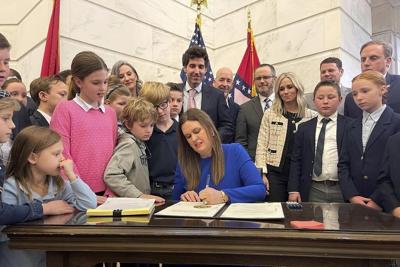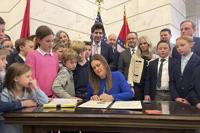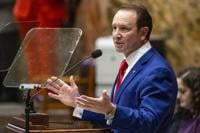LITTLE ROCK, Ark. (AP) — Arkansas Gov. Sarah Huckabee Sanders signed an education bill Wednesday that creates a new school voucher program, raises minimum teacher salaries and places restrictions on classroom instruction on sexual orientation and gender identity.
The Republican governor and former White House press secretary, who took office in January, signed into law the 145-page measure that she's called her priority in this year's legislative session.
“We've seen how the status quo condemns Arkansans to a lifetime of poverty,” Sanders said in a signing ceremony in the state Capitol rotunda, surrounded by GOP lawmakers. “We're tired of sitting at the bottom of national education rankings.”
Many of the details of how the legislation will be implemented have to be worked out in the coming months, as officials write the rules for the voucher program and other aspects of the bill.
Over three years, the plan will phase in an “education freedom account” to pay for private- and home-schooling costs equal to 90% of the state’s per-student funding for public schools, which is currently $7,413. It’s part of a renewed push for such voucher programs following the COVID-19 pandemic that’s been fueled in part by fights over school curriculum.
The state Department of Education has projected that 7,000 students will participate in the program in its first year and 14,000 the following year.
Education Secretary Jacob Oliva said he planned to start to meet Friday with superintendents and school officials from across the state to get their input about how the rules for the voucher program and other aspects of the bill will be crafted.
“I'm already hitting the ground running,” Oliva told reporters after the bill was signed.
The voucher program was strongly opposed by Democrats and teachers' groups who have said it will threaten support for public schools and widen disparities around the state.
"LEARNS creates a tiered system to give some students better advantages than others," Democratic Sen. Greg Leding, the Senate's minority leader, said in a statement after the signing.
Arkansas Education Association President Carol Fleming said schools face a great deal of uncertainty about their budgets and operations for the coming year without many of the details of the vouchers and other parts of the bill in place.
“How will school districts be able to set forth policies for the upcoming school year when we still don’t have the guidance and rules in place from the state Department of Education?” Fleming said.
The bill raises minimum teacher salaries by 39% to $50,000 and follows calls from both parties to raise starting pay from one of the lowest in the country. It also calls for every teacher to receive at least a $2,000 raise in the coming school year.
Opponents have criticized the bill for eliminating the state-mandated salary schedule that sets pay ranges based on education and years of service. Removing that mandate could penalize veteran teachers, opponents said. The legislation requires districts to set their own salary schedules.
The legislation also prohibits classroom instruction on gender identity and sexual orientation before fifth grade, similar to a Florida prohibition that critics have called the . It also puts into law an executive order Sanders signed in January on classroom instruction of critical race theory.
Critics of the restrictions say they create confusion for teachers on what topics are allowed and on just how far the prohibition goes. They've also said the restrictions on gender identity and sexual orientation marginalizes LGBTQ people.
Oliva said the department planned to hold webinars and meetings with school officials about what that restriction entails, along with other parts of the legislation.
“We will definitely be providing technical assistance and guidance to make sure everybody understands what this bill means,” he said.








































